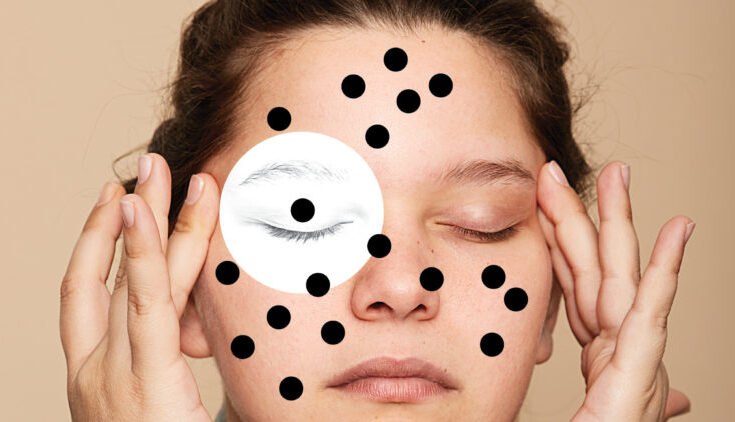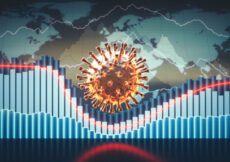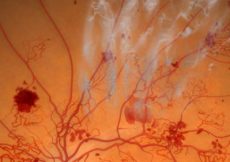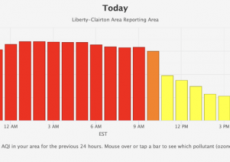“I was about eight weeks postpartum when I started to really break out like I was a 16-year-old,” says Toronto mom-of-one Aileen Brabazon. “All of a sudden, I had big, red, juicy ones all around my jawline and down the sides of my neck.” Like many women, Brabazon experienced her share of acne in her teens, but she thought all that was behind her. “This was unlike anything I’d experienced in my adult years,” says the now 41-year-old.
About 20 to 30 percent of women experience acne as an adult, says dermatologist Paul Cohen, owner of Rosedale Dermatology Centre in Toronto. “And a lot of these women didn’t even have it as a teenager, which sometimes makes it even more frustrating for them.”
Whether breakouts are a new experience for you or an all-too-familiar problem you thought you’d left behind in high school, there are all sorts of solutions out there to explore.
Common causes of adult acne
The first step in taking control of adult acne is understanding why you’re suddenly breaking out. Acne develops when your skin’s pores, which contain both a hair follicle and a sebum gland, become clogged with oil, dead skin cells or bacteria. And there are many ways pores can get blocked on your face, neck, chest or body.
Overzealous mid-life skincare can contribute to acne, says Cohen. Older skin may require more intensive serums, lotions and creams, but it’s possible to go too far with a new-found anti-aging regimen. “Sometimes women start to experiment with wrinkle creams, which can be quite rich and block pores, causing acne,” he says. Add to that over-washing (more than once or twice a day with a gentle cleanser) and exfoliating more than three times a week with products that are too harsh (opt for gentle chemical exfoliants containing lactic acid, for example, over rough scrubs or brushes) and you’re likely to be prompting your skin to produce an excess of oil, which can lead to unwanted breakouts.
Certain foods, like pizza and chocolate, are sometimes blamed for causing pimples, but there isn’t any conclusive proof that specific dietary choices make a big difference. That said, some people’s sensitive digestive systems can react to the inflammatory effects of an overall high-carbohydrate or high-sugar diet, says Cohen. “Consider avoiding high-glycemic foods and dairy, because dairy does seem to make some women break out,” he says.
Other lifestyle factors like poorly managed stress and lack of sleep can also create the right conditions for breakouts. This may be especially (and understandably) true in the postpartum period, when moms tend to be overtired and neglecting their own nutrition because they’re so focused on their newborn, says Cohen.
But often, acne has nothing to do with lifestyle. “The majority of the acne I treat is hormonal,” says Kate McLaird, a naturopath in Toronto. Many women experience what’s been dubbed “post-birth control syndrome,” which occurs when women stop taking the pill after a long period of time, even years. “Coming off the pill, there’s a reconnection of the conversation between the ovaries and the brain, and sometimes it takes a little while for that to regulate,” says McLaird. In the meantime, hormones can fluctuate like crazy, resulting in acne.
We also experience a hormonal roller coaster around our cycle, during pregnancy, postpartum and even later, during menopause. When female hormone levels are at their lowest and male hormones (androgens) peak, sebum production ramps up and there can be a thickening of the skin, which blocks pores and creates the conditions for big-time breakouts. They can pop up as whiteheads, blackheads or cysts, but the telltale sign of hormonal acne is where they appear: along the jawline, neck, back and shoulders.
Banishing breakouts when pregnant or breastfeeding
For very painful or severe cases of acne, whatever the cause, there are intensive medical options like cortisone shots and even light therapy, which can be discussed with a dermatologist. “Light therapy can be safe during pregnancy, but then you have to consider the possibility of it exacerbating melasma,” says Cohen. Pregnancy melasma is a condition that causes dark spots on the face, often across the cheeks, nose, upper lip and forehead, triggered by exposure to light.
Treating even a moderate case of pimples during pregnancy is tricky. “A lot of the ideal medications that we use for acne are contraindicated for pregnancy,” says Cohen. Oral retinoids have been linked to birth defects. Medications that regulate hormone levels, like the pill and spironolactone, as well as the often-prescribed antibiotics used to treat severe cystic acne (an infection deep in the pores that causes large, often painful and inflamed bumps) are also off-limits prenatally and while lactating, he says.
Some prescription topical treatments are no-nos during pregnancy and while breastfeeding, too, because they can be absorbed into the bloodstream and cross the placenta or enter your milk supply. Certain creams and gels containing salicylic acid, for example, can’t be used during pregnancy, but may be deemed safe postpartum, if used in moderation. It’s best to consult your doctor in this case. “Women have to talk to their dermatologist and paediatrician to weigh out the risks and benefits of a product against the severity of the acne,” says Cohen. “Everyone has a different level of comfort around this.”
Many over-the-counter products are considered safe for moms. A gel containing benzoyl peroxide can work wonders as a nighttime spot treatment for breakouts on the back and shoulders, though you should keep it off your chest if you’re breastfeeding. There are other options, too, if you prefer a more conservative approach: “You could also use a body cleanser with glycolic acid, because it’s derived from sugar cane—it’s a totally safe exfoliant,” says Cohen. Tea tree oil has also been proven to effectively reduce redness and inflammation almost as well as benzoyl peroxide for some people.
Those seeking a more natural solution may want to look into taking an omega-3 fatty acid supplement. “Fish oil is something I would absolutely recommend for acne because it’s anti-inflammatory,” says McLaird. Other key supplements for clear skin can include vitamin D and probiotics, she says.
When it comes to treating acne, it’s not always a straight line from pimple to prescription, because the problem can be complex. Looking at the health of the whole body is important, says McLaird. “For example, it’s not a coincidence that a lot of adults with acne are also constipated,” she says. “Metabolized estrogens in our body need to be evacuated through the stool, but if we’re constipated, those estrogens that should be excreted can recirculate and attach to estrogen receptors at the level of the skin [resulting in breakouts],” she says. “It’s all linked.” Getting enough sleep, managing your stress levels and eating well are all key factors in treating acne.
Brabazon’s son is now two, and yet she’s still experiencing breakouts, especially on her neck.
“I had great skin during pregnancy—and I mean, gorgeous, glowing skin—and I have not-so-great skin right now. Oh well,” says Brabazon. “It will level out eventually, and for now, if I’m going out for dinner or something, I’ll just wrap my most beautiful scarf around my neck and go—I have other things to worry about,” she says.
For parents who are finding their pimples especially distressing, the experts recommend seeking professional help to get to the root cause and to establish an effective treatment plan. “If you’re beyond pregnancy and lactation, there are so many effective treatments available,” says McLaird. “They may take time, but something will work for you.” And if you’re expecting, think of it this way: “Pregnancy acne is essentially a sign of a good thing—it’s because you’re pregnant.”



































